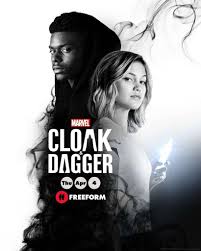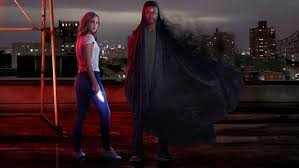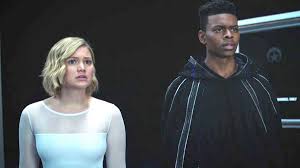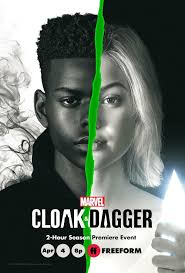In an era where television is saturated with superheroes, crime dramas, and fantasy epics, The Cloak and the Dagger emerges as a series that dares to blend all three into a story that feels both intimate and expansive. At its core, the show is not just about extraordinary powers or high-stakes battles—it is about two individuals navigating a world that constantly tests their trust, resilience, and humanity.
The series introduces audiences to two central figures whose lives could not be more different, yet whose destinies are inextricably linked. Cloak, shrouded in mystery and darkness, embodies the weight of secrecy and the struggle of carrying burdens unseen by the world. Dagger, sharp and luminous, represents clarity, truth, and the piercing force of justice. Together, they form a partnership that is as fragile as it is powerful, constantly teetering between unity and conflict.
What makes The Cloak and the Dagger stand out is its ability to use these characters as metaphors for larger societal issues. The cloak is not just a garment of concealment but a symbol of the hidden struggles many face—poverty, trauma, and systemic injustice. The dagger, meanwhile, is more than a weapon; it is a reminder of the sharp truths that cut through denial and corruption. By weaving these symbols into its narrative, the series elevates itself beyond simple entertainment, offering commentary on the complexities of modern life.
Visually, the show leans into its themes with striking contrasts. Dark, shadowy cinematography underscores moments of secrecy and despair, while bursts of light and color highlight moments of revelation and hope. The atmosphere is gritty yet stylish, creating a world that feels both grounded in reality and tinged with the surreal. This balance allows the series to appeal to fans of grounded dramas while still satisfying those who crave the spectacle of fantasy.
Character development is another of the show’s strengths. Cloak and Dagger are not static archetypes but evolving individuals whose flaws and vulnerabilities make them relatable. Cloak’s internal battles with fear and isolation mirror the struggles of anyone who has felt unseen or misunderstood. Dagger’s determination to fight for justice, even when it comes at personal cost, resonates with those who believe in the power of truth. Their relationship—sometimes tense, sometimes tender—serves as the emotional anchor of the series, reminding viewers that even in a world of shadows, connection is possible.
Beyond its characters, The Cloak and the Dagger resonates because of its cultural relevance. In a time when conversations about inequality, corruption, and identity dominate headlines, the series reflects these realities through its storytelling. It does not shy away from difficult questions: Who gets to decide what is just? How do individuals fight against systems larger than themselves? And what happens when the line between hero and villain blurs?
The show’s appeal lies in its ability to speak to multiple audiences. For younger viewers, it offers a coming-of-age story wrapped in mystery and action. For fans of thrillers, it provides suspense and intrigue. For those seeking deeper meaning, it delivers layered symbolism and social commentary. In this way, The Cloak and the Dagger is more than just another entry in the crowded television landscape—it is a series that invites reflection as much as it entertains.
Ultimately, The Cloak and the Dagger is a story about survival in a world of uncertainty. It is about the courage to face the shadows, the wisdom to wield the truth, and the strength to trust another person when trust feels impossible. In its blend of action, symbolism, and humanity, the series offers viewers not just a tale of heroes, but a mirror to the struggles and hopes of our own time.
As television continues to evolve, shows like The Cloak and the Dagger remind us that the most powerful stories are not those that simply dazzle with spectacle, but those that illuminate the hidden corners of our lives. In the interplay of light and darkness, secrecy and revelation, the series finds its voice—and in doing so, it gives audiences a reason to keep watching.



